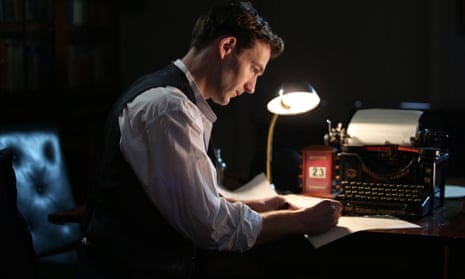It’s a bit like that Radio 4 programme The Long View. An Australian newspaper man named Murdoch is called before an official inquiry, to answer questions… Not 2012, Leveson, into the culture of the British press, but 1917, the Dardanelles Commission, investigating the tragedy and scandal known as Gallipoli. And not The Long View either, but Gallipoli: When Murdoch Went to War (BBC2, Saturday).
Same Murdoch family, though – Keith is Rupert’s father, a reporter, who wrote a controversial letter documenting the disastrous campaign. Rupert features here, looking and behaving younger and less doddery (of body and mind) than he did at Leveson, interestingly.
His take on the whole thing is very much a son’s – that Dad was a fierce patriot and a taker-on of the establishment who defied military censorship to bring down a bumbling Pommy general (Sir Ian Standish Hamilton) and save the lives of thousands of heroic, hunky Australians. The truth, it seems, is more complex, and more interesting. It may have been a military disaster and a tragic loss of life, but British casualties were much greater than Anzac forces; more French soldiers died than Aussies. And Keith Murdoch, whose career up to that point had been marked mainly by failure and missing out on jobs, and who was at Gallipoli for only a few days, on his way to London, may not have been motivated entirely by getting to the truth. In fact, some of his report, such as the claim that troops had to be forced into battle at gunpoint, almost certainly wasn’t true at all.
“Of course we want to try to tell the truth, but on the other hand most of us are driven predominantly by personal ambition and a lust for adventure,” Max Hastings, who made his own name covering another conflict, gamely admits. “And boy, Keith Murdoch knew how to promote Keith Murdoch.” Of course, Max went on to work for arch-rivals of Keith Murdoch’s son, so that probably has to be taken into account when listening to what he has to say.
It’s not just the story of a botched allied campaign (and a great Ottoman victory), then, but one of rivalries, personal ambition, and the beginnings and ends of empires – media ones, as well as actual ones. You could say that without this whole episode and the career it sparked, Murdoch Jr (if it’s possible to call an 84-year-old “junior”) would never have become who he is today. A further tragedy of Gallipoli, some might say.
The best character in all this – best as in best value, not most good – is a chap called Ellis Ashmead-Bartlett. A proper old-school (Marlborough) war correspondent, E A-B took a French chef with him to war, plus a case of champagne and another one of arrogance, and he wore a yellow and red silk dressing gown. They don’t make them like that any more – war correspondents, not dressing gowns. I don’t think even Sir Max wore a silk dressing gown to the south Atlantic.
It was actually Ashmead-Bartlett’s critical letter that Murdoch Sr was taking to the prime minister, Herbert Asquith, in London when it was intercepted by military police at Marseille. So Murdoch wrote his own. An opportunistic postman, you might call him. Certainly a man who used the methods of the popular sensationalist press for his personal gain and to achieve his political aims. Again, sound familiar?
And a splendid final – don’t worry, only for now – episode of Poldark (BBC1, Sunday). Hard times, salted herrings, crashing waves and a wreck, the Queen Charlotte, on the rocks, on her maiden voyage. Plus putrid throats and tragedy. Nooooooo! Is there anything in this world as sad as a little coffin?
On the plus side, though, Aidan does do sad-sexy very well. I’ll comfort you any time you like, a nation’s women sigh. Replace your loss too, perhaps, to fill the void and the crib – well, once you’ve sorted out the finances, maybe.
Sorry, ladies, he’s taken, because Demelza bravely battles her own putrid throat, and wins! Together they stand, arm in arm on the clifftop, looking out to sea, united in grief and love, their magnificent manes, copper and black, dancing in the breeze, while below them the Atlantic boils, angrily. Is there a more glorious sight on television?*
But then a bunch of soldiers in red coats show up to arrest Ross on charges of wrecking, rioting and murder. And to lead the way towards series two. I think that’s what’s called a cliff-hanger.
*No, there isn’t.

Comments (…)
Sign in or create your Guardian account to join the discussion